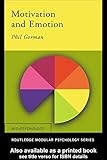Motivation and Emotion.
Material type: TextSeries: Routledge Modular Psychology SerPublisher: London : Routledge, 2004Copyright date: ©2003Edition: 1st edDescription: 1 online resource (142 pages)Content type: text Media type: computer Carrier type: online resourceISBN: 9780203694978Subject(s): EmotionsGenre/Form: Electronic books.Additional physical formats: Print version:: Motivation and EmotionDDC classification: 153.8 LOC classification: BF503.G67Online resources: Click to View
TextSeries: Routledge Modular Psychology SerPublisher: London : Routledge, 2004Copyright date: ©2003Edition: 1st edDescription: 1 online resource (142 pages)Content type: text Media type: computer Carrier type: online resourceISBN: 9780203694978Subject(s): EmotionsGenre/Form: Electronic books.Additional physical formats: Print version:: Motivation and EmotionDDC classification: 153.8 LOC classification: BF503.G67Online resources: Click to View Book Cover -- Half-Title -- Dedication -- Title -- Copyright -- Contents -- lllustrations -- 1 Introduction -- Motivation -- Theories of motivation -- Emotion -- What are emotions? -- Theories of emotion -- Chapter summary -- Further reading -- 2 The physiological approach to motivation -- Physiological theories of motivation -- Instinct theory -- How many instincts? -- Physiological drives -- The structure of the nervous system -- The neuron -- Central and peripheral nervous system -- Autonomic nervous system -- Endocrine system -- Homeostatic drive theory -- Temperature regulation -- Set point -- Detector -- Control mechanism -- The prospective element -- Evaluation -- Chapter summary -- Further reading -- 3 Motivation and the brain: hunger -- Hunger -- How do we know we are hungry? -- Homeostasis and hunger -- Glucostatic theory -- Evaluation -- Why don't we eat ourselves to death? -- The role of the hypothalamus -- Ventromedial hypothalamus -- Lateral hypothalamus -- Evaluation of dual hypothalamic control -- Lipostatic theory -- Evaluation -- Settling-point hypothesis -- Obesity -- Anorexia nervosa -- Chapter summary -- Further reading -- 4 Motivation and the brain: thirst -- Thirst and drinking -- How do we know we are thirsty? -- Homeostasis and fluid regulation -- Types of thirst -- Osmotic thirst -- Osmoreceptors -- Volumetric thirst -- Evaluation -- What makes us stop drinking? -- Primary and secondary drinking -- Alcohol and alcoholism -- Chapter summary -- Further reading -- 5 Psychological theories of motivation -- Incentives and needs -- Maslow's hierarchy of needs -- Evaluation -- The need for achievement -- Application to sport -- Expectancy theory -- Application to work -- Goal-setting theory -- Chapter summary -- Further reading -- 6 A combined approach to motivation -- Arousal -- Fight or flight -- Needs and drives.
Drive reduction theory -- Evaluation -- Pain and pleasure -- Opponent process theory -- Evaluation -- Optimal level of arousal theory -- Evaluation -- A sporting chance? -- Chapter summary -- Further reading -- 7 Emotion and the brain -- Types of emotion -- Brain mechanisms -- The ANS and emotion -- Evaluation -- Emotions and the limbic system -- The Kluver-Bucy syndrome -- Evaluation -- Neurochemical influences -- Evaluation -- The hemispheres of the cerebral cortex -- Evaluation -- Facial feedback -- The influence of culture on emotional expression -- Chapter summary -- Further reading -- 8 Explaining emotional behaviour and experience -- Theories of emotion -- Physiological theories -- The James-Lange theory -- Evaluation -- The Cannon-Bard theory -- Evaluation -- The polygraph (lie detector) test -- Psychological theories -- Cognitive labelling theory -- Evaluation -- The role of cognition in emotion -- Evaluation -- Parkinson's four-factor theory-a combined approach to emotion -- Chapter summary -- Further reading -- 9 Study aids -- IMPROVING YOUR ESSAY-WRITING SKILLS -- Practice essay 1 -- Starting points -- Candidate's answer -- Examiner's comments -- Practice essay 2 -- Starting points -- Candidate's answer -- Examiner's comments -- KEY RESEARCH SUMMARIES -- Summary 1 -- Notes -- Introduction -- Method -- Results -- Discussion -- Evaluation -- Summary 2 -- Notes -- The 'feeling' of hunger -- Extraordinary facts! -- Evaluation -- Summary 3 -- Notes -- Introduction -- Method -- Results -- Discussion -- References -- Index.
Motivation and Emotion provides an explanation of emotional experience and aspects of human behaviour using psychological, physiological and alternative approaches. The brain mechanisms that govern motivations are discussed and questions such as 'Why don't we eat ourselves to death?' and 'How do we know we are thirsty?' are answered. Phil Gorman is an A-Level teacher at Stafford College, UK, and a chief examiner for the Edexcel A Level Examination Board. The Routledge Modular Psychology series is a completely new approach to introductory level psychology, tailor-made for the new modular style of teaching. Each book covers a topic in more detail than any large textbook can, allowing teacher and student to select material exactly to suit any particular course or project. Especially written for those students new to higher-level study, whether at school, college or university, the books include the following designed features to help with technique: practise essays with specialist commentary to show how to achieve a higher grade chapter summaries and summaries of key research glossary and further reading progress and review exercises. Series editors: Cara Flanagan is a Reviser for AS and A2 level Psychology and an experienced teacher and examiner. Philip Banyard is Associate Senior Lecturer in Psychology at Nottingham Trent University and a Chief Examiner for AS and A2 level Psychology.
Description based on publisher supplied metadata and other sources.
Electronic reproduction. Ann Arbor, Michigan : ProQuest Ebook Central, 2018. Available via World Wide Web. Access may be limited to ProQuest Ebook Central affiliated libraries.

There are no comments on this title.